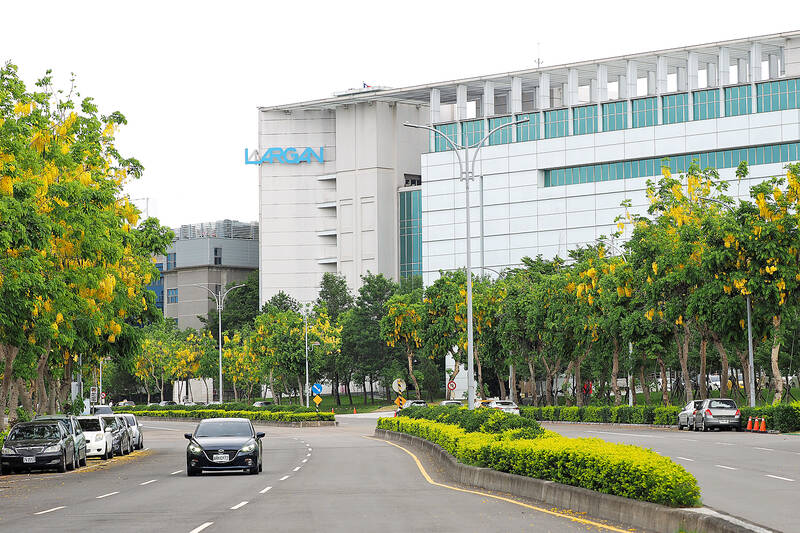Largan Precision Co (大立光), a major camera lens supplier for Apple Inc’s iPhones, yesterday posted a sequential decline of 16.5 percent in net profit for last quarter due to massive foreign exchange losses, even though operating income more than doubled over the period.
Net profit dipped to NT$4.97 billion (US$159.8 million) compared with NT$5.95 billion in the third quarter, the company said, and it booked NT$2.85 billion in foreign exchange losses, it added.
On an annual basis, net profit jumped 23.63 percent from NT$4.02 billion. Operating income rose to NT$7.91 billion from NT$3.88 billion a quarter earlier and NT$6.77 billion the prior year.

Photo: David Chang, epa/efe
Earnings per share were NT$37.25 last quarter, compared with NT$44.6 the previous quarter and NT$30.1 a year earlier, the company said.
A bright spot is gross margin, which bounced back to 52.8 percent last quarter from 42.55 percent in the prior quarter, the first pickup in a year, attributable to improved yield rates and favorable production portfolios.
The Gross margin had dropped below 50 percent for the first time in the company’s history during the January-March period of last year. Its recovery — although still lower than 55.87 percent in the fourth quarter of 2022 — was due to Largan’s breakthrough in making advanced tetraprism periscope lenses, which were first used in iPhone 15 Pro Max last year.
This year, more smartphone vendors are to adopt tetraprism periscope lenses, Largan chief executive officer Adam Lin (林恩平) told an online investors’ conference yesterday.
The company received some orders for better-priced camera lenses last quarter, with some of them extending into this quarter, Lin said.
Looking forward, Lin said Largan’s revenue this quarter would be lower than the previous
quarter as the electronics industry enters its traditional slow season. Lower factory utilization would also weigh on the company’s gross margin this quarter, he said.
Overall, the slowdown “is no different from previous ones,” Lin said. “Demand looks okay.”
Customers’ inventories are still at healthy levels, he said.
There are early positive signs in the market, Lin said, noting that some smartphone vendors are gaining confidence about high-end smartphone demand this year. Largan has landed some design-in projects for camera lens upgrades, he said.
When asked about the uptake of advanced periscope lenses, Lin said more customers plan to adopt them this year.
Last year as a whole, Largan’s net profit fell 20.87 percent to NT$17.9 billion, compared with NT$22.62 billion in 2022. Earnings per share slid to NT$134.18 from NT$169.47 and gross margin deteriorated to 48.71 percent from 54.7 percent.
Shipments of 10-megapixel lenses made up the bulk of the company’s shipments last year, accounting for between 50 and 60 percent, while those with more than 20 megapixels made up between 10 and 20 percent, the company said.

WEAKER ACTIVITY: The sharpest deterioration was seen in the electronics and optical components sector, with the production index falling 13.2 points to 44.5 Taiwan’s manufacturing sector last month contracted for a second consecutive month, with the purchasing managers’ index (PMI) slipping to 48, reflecting ongoing caution over trade uncertainties, the Chung-Hua Institution for Economic Research (CIER, 中華經濟研究院) said yesterday. The decline reflects growing caution among companies amid uncertainty surrounding US tariffs, semiconductor duties and automotive import levies, and it is also likely linked to fading front-loading activity, CIER president Lien Hsien-ming (連賢明) said. “Some clients have started shifting orders to Southeast Asian countries where tariff regimes are already clear,” Lien told a news conference. Firms across the supply chain are also lowering stock levels to mitigate

IN THE AIR: While most companies said they were committed to North American operations, some added that production and costs would depend on the outcome of a US trade probe Leading local contract electronics makers Wistron Corp (緯創), Quanta Computer Inc (廣達), Inventec Corp (英業達) and Compal Electronics Inc (仁寶) are to maintain their North American expansion plans, despite Washington’s 20 percent tariff on Taiwanese goods. Wistron said it has long maintained a presence in the US, while distributing production across Taiwan, North America, Southeast Asia and Europe. The company is in talks with customers to align capacity with their site preferences, a company official told the Taipei Times by telephone on Friday. The company is still in talks with clients over who would bear the tariff costs, with the outcome pending further

Six Taiwanese companies, including contract chipmaker Taiwan Semiconductor Manufacturing Co (TSMC, 台積電), made the 2025 Fortune Global 500 list of the world’s largest firms by revenue. In a report published by New York-based Fortune magazine on Tuesday, Hon Hai Precision Industry Co (鴻海精密), also known as Foxconn Technology Group (富士康科技集團), ranked highest among Taiwanese firms, placing 28th with revenue of US$213.69 billion. Up 60 spots from last year, TSMC rose to No. 126 with US$90.16 billion in revenue, followed by Quanta Computer Inc (廣達) at 348th, Pegatron Corp (和碩) at 461st, CPC Corp, Taiwan (台灣中油) at 494th and Wistron Corp (緯創) at

NEGOTIATIONS: Semiconductors play an outsized role in Taiwan’s industrial and economic development and are a major driver of the Taiwan-US trade imbalance With US President Donald Trump threatening to impose tariffs on semiconductors, Taiwan is expected to face a significant challenge, as information and communications technology (ICT) products account for more than 70 percent of its exports to the US, Chung-Hua Institution for Economic Research (CIER, 中華經濟研究院) president Lien Hsien-ming (連賢明) said on Friday. Compared with other countries, semiconductors play a disproportionately large role in Taiwan’s industrial and economic development, Lien said. As the sixth-largest contributor to the US trade deficit, Taiwan recorded a US$73.9 billion trade surplus with the US last year — up from US$47.8 billion in 2023 — driven by strong